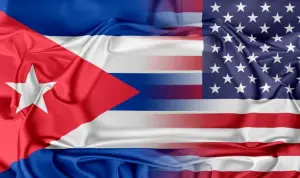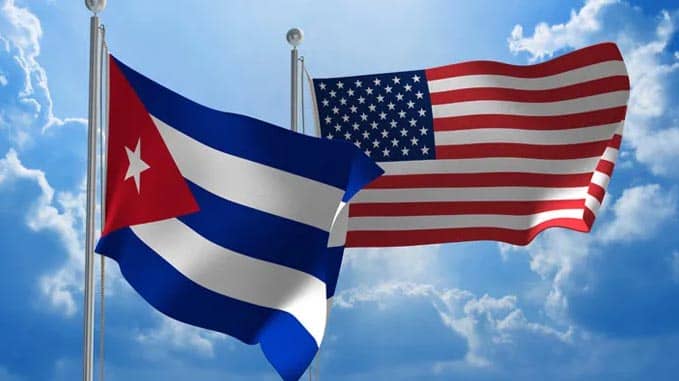The United States and the Handling of the Immigration Issue

The total number of undocumented migrants from Cuba is once again in the news. Once again this issue is related to the occurrence of an economic crisis in the country and the disrespect to the migration agreements signed between Cuba and the United States. In U.S. public opinion, the treatment of Cubans is perceived as a singularity that can be questioned.
But it is important to understand against what backdrop these events are taking place and what may be the evolution of the migration issue in that country in the coming years.
Almost all U.S. politicians and scholars, who have a permissive and accepting view of the migratory phenomenon from abroad, start from a commonplace: the United States is a country of immigrants. This statement, which seems magnanimous, inclusive and even progressive, is in itself a bias towards history.
The space that this country occupies today had a native population that was almost totally massacred and stripped of its territory. The latter was turned into merchandise, monetarized and acquired as a source of original accumulation, which allowed the development of a voracious slavery and an overpowering capitalism.
Having clarified this background, it should be remembered that the impulse, priority, times and geographies of the migratory movement to the United States (and in the world in general) have been determined by purely economic factors, even if from time to time they have political overtones and are used to defend agendas and gain access to elective positions.
The extension of North America (United States and Canada) is vast. The creation of colonies, dominions and states required an injection of population that was not fulfilled by the birth rates of the residents alone. For generations, the hardest and lowest paid jobs went to those newcomers who accepted any remuneration in order to survive and settle.
The U.S. colonization of the vast territory of northern and northeastern Mexico turned millions of U.S. natives (and their descendants) into foreigners in their own land, and to this day they have been treated as second-class citizens.
Each war against enemies fabricated by the imperialist narrative created its own sprinkling of immigrants, from Puerto Ricans and Cubans, to Vietnamese, Russians, or Iraqis. Gradually, the funnel closed and more restrictive immigration regulations began to be passed, as criminal attitudes or high unemployment rates became politically associated with the arrival of non-native strangers. A poor Italian from the South of the peninsula was culturally pigeonholed by the social culture in the environment of the Cossa Nostra, while the German scientist imported on a preferential visa in the 40s of the 20th century was not necessarily labeled as a Nazi sympathizer.
At very specific moments, such as the rise of West Berlin, or the events in Hungary between 1956 and 1958, the U.S. immigration authorities created waivers to adjust the citizenship status of Germans and Hungarians, on an exceptional basis and for a limited period of time.
At the end of the 1950s, there were 125,000 Cubans living permanently in the United States, while another large but imprecise number of Cubans traveled to the United States for different periods of time, without establishing residency.
When the Cuban Revolution took place, members of Fulgencio Batista’s regime, family members, acolytes and servants were massively admitted to the United States. It was estimated that they would be there only temporarily, since they would travel back to recover their possessions when Washington “solved the Cuban problem”.
By 1966, when temporariness became permanence, the Cuban Adjustment Act was passed, with the objective of regularizing the migratory status of tens of thousands of Cubans. The “adjustment” was to be made in the migratory condition of Cubans who arrived between January 1, 1959 and November 2, 1966, when the new legislation was signed. But the door was left open.
Attempts to overthrow the Cuban Revolution remained in place, as did the willingness to give differential treatment to the immigration “collateral damage” of the aggression. No other immigrant group in the U.S. received or receives such a privilege.
In view of the 2016 presidential election cycle, there were two main partisan positions in the United States on how to regularize the status of 12 million undocumented persons residing in the country. It is worth clarifying that there were, and are, no essential differences between Democrats and Republicans as to how to regulate the granting of visas abroad to guarantee the theft of brains, hunt for talent and selectively import labor force for specific jobs, for specific periods of time.
In the first three decades of the 21st century, the Democrats had secured solid electoral support among immigrant minorities, particularly Hispanics, and had seen how, through demographic changes, they had managed to change the color of states or cities that had traditionally been Republican.
The Republicans, on the other hand, walking the narrow space of trying to provide limited spaces of welcome to immigrants, but never the rights of citizenship, saw with concern that a breakthrough by their rivals on the issue could mark differences in voter registration that would define the outcome of many elections to come.
The emergence of social categories such as the Dreamers or legislative proposals such as Deferred Action for Childhood Arrivals (DACA) also created a cultural mystique in the sense that, at some point in the near future, a part of the undocumented in the United States could see their dreams come true.
This illusion that jumped to the movies, radio and television, concealed the reality that during his eight years in office, Democratic President Barack Obama repatriated the largest number of immigrants in historical terms, to the point that the nickname Deporter in Chief arose, alluding to his status as Commander in Chief in military terms.
When it seemed that the die was cast between these two differentiated electoral positions, a third unexpected variant appeared, the one proposed by Trumpism as of January 2017.
With his misogynist and racist discourse, his hate campaigns, more than his concrete actions, Donald Trump pursued an economic objective, of undoubted political consequences, but conceived from his business logic: to reduce the value of the immigrant labor force, and he succeeded.
If up to that moment immigrants who aspired to be documented in order to become citizens and have access to the ability to propose and choose, participated in public events, attended associative spaces, with the harassment suffered under Trumpism they literally took refuge in their communities.
In sectors such as construction, essentially nourished by imported labor force, wages fell as much as the employee’s ability to claim a raise, faced with the threat of being separated from their environment immediately and permanently.
However, the Donald Trump administration took on particular policies of harassment against three countries (Venezuela, Cuba and Nicaragua), which could be expected to produce significant migratory flows themselves. Once again, U.S. migration policy showed fractures, inconsistencies and incoherence from the strictest normative point of view.
Migratory flows from these three destinations registered a statistical and political preeminence over those that until that moment had attracted more media attention: Salvadorans, Guatemalans and Hondurans.
By the end of the Trump administration, the Mexico Wall, the banner of his anti-immigrant crusade, had not been built, much less the objectives of intervention in Caracas, Havana, or Managua achieved.
Biden’s first two years on the immigration issue have moved between the contradictions of trying to rescue the Obamist agenda of trying to have more electoral support among immigrant communities, suffering half-heartedly the effects of the failure of the recipes for regime change and, at the same time, trying to rearrange the selection process of qualified immigrants needed by the U.S. economy.
In the Cuban case, once again, part of the U.S. executive acted irresponsibly (closing of consular offices, elimination of regular flights, non-compliance with immigration agreements) in the face of the Cuban migratory flow, to finally remind that it is preferable to assume this problem through the use of mutually consensual mechanisms that have shown their usefulness in the past. It seems that another sector of the federal agencies is now succeeding in imposing its vision that greater cooperation with Cuba provides more stability in what they call the southern border.
There are, however, other less visible factors that call for “order”. When migration flows into the interior of the United States exceed budgeted levels, then funds for a variety of social projects become scarce. Suddenly there are coincidences and agreements between supposed political enemies, Republican mayors and councilmen coincide with the intentions of Democratic presidents, or vice versa.
In spite of the current histrionics of Floridian congressmen of Cuban origin, in the sense of guaranteeing the special rights of those who arrive from the Island and support their agenda, there is a contradiction that they are unable to explain: if Cubans vote mostly on the Republican side and “flee” from Cuban socialism, then why Hialeah, the population with the highest density of inhabitants of Cuban origin in the entire Union, is at the same time the main place in the United States in terms of registration of beneficiaries of Obamacare, a program that offers free public health services at the expense of the federal budget and which is labeled by its opponents as “socialist”.
The arrival of Cubans in an unregulated manner, on the other hand, prevents local Republican chieftains from collecting political favors and conditioning the arrival of new immigrants to support agendas that guarantee to continue bleeding the budget coffers, which U.S. taxpayers fill with their taxes.
Available at: https://resumen-english.org/2023/01/the-united-states-and-the-handling-of-the-immigration-issue/#more-22528 Translation by Resumen Latinoamericano - US



Déjanos tu comentario